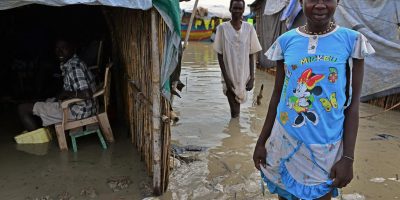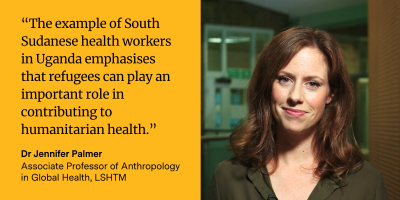We advocate for ethnomusicology—the critical study of the dialogical relationship between music and the contexts that define it—as one of the research approaches that humanitarians and peacekeepers should use to better understand civilians’ self-protection strategies during conflict. Humanitarian protection strategies have not kept all civilians safe, so there is growing scholarly and policy attention to self-protection strategies. It is important that humanitarians do not simply instrumentalise self-protection strategies but understand the politics and logics behind them. This article argues that paying attention to music can help humanitarians understand self-protection strategies, especially as music can create space for discussion even about emotive or political topics that cannot be verbalised in other ways. Musicians also often have an authority that can help shape behaviour, and songs are often used to share strategies to stay safe. Music can also create important memories and social meanings around protection strategies. This article is based on research in Warrap State, South Sudan—a region that has long histories of colonial and post-colonial armed conflict, military mobilizations and aid actor interventions as well as established musical norms and evolving self-protection strategies.
Article
Sing safety: understanding South Sudanese protection strategies through song
Regions
East and Southern AfricaCountries
South SudanRegional Hub
Central and East Africa HubRegional Hub Themes
Displacement and humanitarian protectionDOI: https://doi.org/10.1111/1758-5899.13498
See also
Research paper
“He Cannot Marry Her”: Excluding The Living And Including The Dead In South Sudanese Citizenship In Sudan
Using qualitative interviews and observations of Nuer chiefs’ courts to examine reforms to marriage laws within a South Sudanese refugee camp in Sudan, this article argues that chiefs’ courts contested humanitarian assumptions about citizenship by re-emphasising kinship as the primary…
Central and East Africa Hub
2022
Blog
Bottom-up humanitarian protection: the experience of a young South Sudanese car-cleaner in Khartoum
What kinds of humanitarian protection are available for displaced people living outside of refugee camps? This article explores the forms of safety and protection available to displaced south Sudanese people living in Sudan, including community-based mechanisms such as family and…
Central and East Africa Hub
2021
Briefing
Humanitarian responses to famine and war in Sudan
This Key Considerations brief offers key information about the background to the civil war in Sudan, responses to the humanitarian crisis and reasons why relief has been inadequate, setting out opportunities to push against the obstacles or constraints to relief.
Central and East Africa Hub
SSHAP
2024
Research paper
Protection and well-being of adolescent refugees in the context of a humanitarian crisis: Perceptions from South Sudanese refugees in Uganda
Improved understanding of refugees’ perceptions of provision of humanitarian support is important to improve design and delivery of humanitarian assistance. Refugee adolescents face a range of adversities, while the phase of displacement likely influences risk factors for adolescent refugees. However,…
Science Direct
2019
Blog
A widow’s story of survival and humanitarianism in the Sudans
The story of Nyapuottek, a widow from the Sudanese war, illustrates how fraught it can be to navigate changing relations during times of conflict and migration, and how such struggles can intersect with humanitarian initiatives.
Central and East Africa Hub
2023
Report
Assessment of communication, community engagement and accountability in Sudan
An assessment of response-wide communication, community engagement and accountability (CCEA) work with the affected population in Sudan.
Central and East Africa Hub
2021

Briefing
A rapid qualitative study on preparedness and community perceptions, Yei River State, South Sudan
This research was commissioned by the EVD Preparedness Consortium comprising Save the Children, Concern Worldwide and Internews in South Sudan. It provides information on community perceptions about the Ebola outbreak and preparedness activities in Yei River State. The study was…
Central and East Africa Hub
ReliefWeb
2019
Infographic
Crisis in Sudan: Note on displacement from Sudan to South Sudan
This infographic summarises the insights from a recent briefing note on displacement due to the crisis in Sudan.
Central and East Africa Hub
SSHAP
2023
Briefing
Crisis in Sudan: Briefing note on displacement from Sudan to South Sudan
This Key Considerations brief focuses on the historical and socio-political dynamics humanitarian agencies need to consider when providing assistance to South Sudanese fleeing Khartoum and other parts of Sudan to South Sudan, and to Sudanese fleeing Sudan to South Sudan.
Central and East Africa Hub
SSHAP
2023
Related content

news
Overcoming barriers: Integrating South Sudanese refugee health professionals into Uganda’s workforce
21st June 2024
Around the world many health professionals displaced as refugees face multiple barriers to securing meaningful work in host countries' health systems. Dr Jennifer Palmer, Associate Professor of Anthropology in Global Health, LSHTM, and SSHAP team member, talks about her research among South Sudanese health workers who are refugees in Uganda.
Central and East Africa Hub


